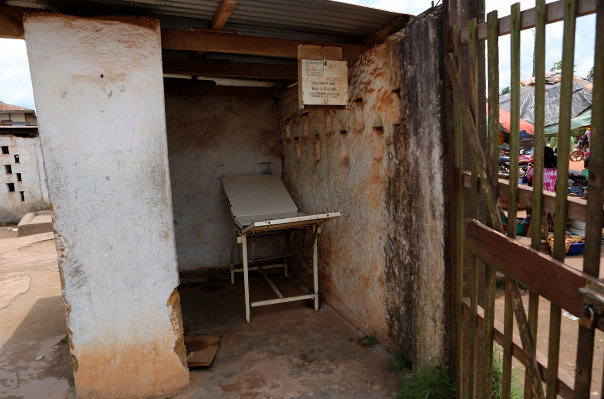By Maya Brownstein | Annual Giving Assistant
Above: A labor and delivery bed in Liberia's Pleebo Health Center, before Partners In Health renovated. This is one example of the inadequate facilities that comprised the country's weak health system.
Ebola may not dominate the news cycle anymore, but the crisis is far from over, as Sierra Leone and Liberia continue to suffer the consequences of an epidemic that killed thousands and destroyed already-weak health systems. Partners In Health is committed to rebuilding these systems to protect against another epidemic as well as to improve health and welfare across West Africa. While much of the international relief effort has ceased in Sierra Leone and Liberia, PIH's work in these countries is only beginning -- and it's all possible thanks to your support.
The Atlantic recently published an article about the devastating aftermath of Ebola in Liberia. At the hand of the epidemic, the country faces increased levels of food insecurity, poverty and displacement. Meanwhile, fear of and miseducation about the virus remain. All of these factors lead to a higher risk of emerging diseases -- and a strong possibility of a resurgence of Ebola itself.
We're pleased to share that PIH's own Bryan Murphy-Eustis provides insight and perspective on the Ebola crisis in The Atlantic's article. Below is an excerpt:
"Bryan Murphy-Eustis, the executive director of Partners in Health Liberia, says, “If you believe, as I do, that Ebola preyed upon a fractured health system, then anything less than a systematic and long-term strengthening of the health system falls short of what’s needed.” But 30 to 40 percent of Liberians lack access to health care today, just the same as before the epidemic. And now that aid budgets are moving on to the next international emergency, Zika, only one Ebola treatment center remains operational. “Ebola eroded the already weak confidence in the health system,” Murphy-Eustis says, and serious new health problems have begun to emerge. During the outbreak, “mass vaccination campaigns were postponed to avoid public gatherings,” he says. Drug regimens for contagious diseases were disrupted, which has led, for instance, to an increase in mortality from multiple-drug-resistant tuberculosis."
We encourage you to read the full article here.
Thank you again for your continued support of West Africa and PIH's work.
Links:
Project reports on GlobalGiving are posted directly to globalgiving.org by Project Leaders as they are completed, generally every 3-4 months. To protect the integrity of these documents, GlobalGiving does not alter them; therefore you may find some language or formatting issues.
If you donate to this project or have donated to this project, you can receive an email when this project posts a report. You can also subscribe for reports without donating.
